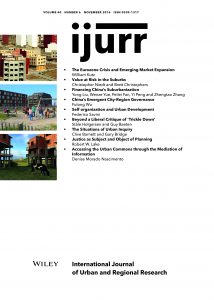This article examines the emergence of city-region governance as a specific state spatial selectivity in post-reform China. The process has been driven by the state in response to the crisis of economic decentralization, and to vicious inter-city competition and uncoordinated development. As part of the recentralization of state power, the development of urban clusters (chengshiqun) as interconnected city-regions is now a salient feature of ‘new urbanization’ policy. I argue in this article that the Chinese city-region corresponds to specific logics of scale production. Economic globalization has led to the development of local economies and further created the need to foster ‘regional competitiveness’. To cope with regulatory deficit at the regional level, three mechanisms have been orchestrated by the state: administrative annexation, spatial plan preparation and regional institution building, which reflect recent upscaling in post-reform governance.

